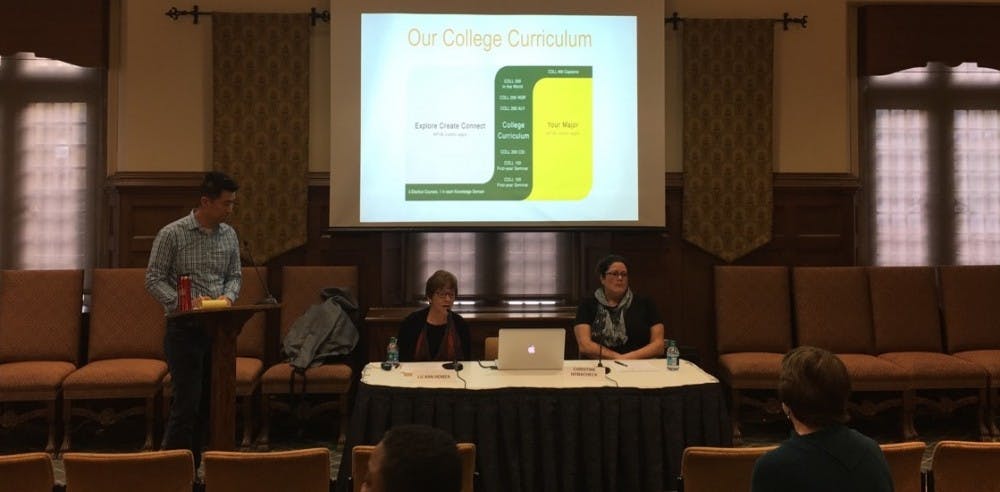A newly-formed committee assessing the adequacy of the general education curriculum hosted a panel on Thursday featuring information about a similar program at the College of William & Mary.
The town hall-style panel was hosted by the committee chaired by Eugene Wu, associate professor of biology and biochemistry.
There is strong interest across demographics on campus to review the GEC, which the committee anticipates capitalizing upon by hosting public events to gather ideas from across the UR community, Wu said.
Tasked by the Faculty Senate, the committee will collect ideas, opinions and data from students, faculty, administration, alumni and stakeholders regarding how well the university's GEC addresses the needs of students and reflects the values and mission of the university, he said.
Directors of programs relevant to general education, including Mary Tate, director of first-year seminars, David Bradenberger, chair of the general education committee, Anna Young, director of advising and Melanie Jenkins, director of institutional effectiveness, will consult the committee.
The GEC review committee is not responsible for creating a new curriculum for UR, but Wu considers the value of the thought process and hard work that went into another school’s curriculum review and revision crucial.
William & Mary’s curriculum is one key example. In 2011, a curriculum review steering committee formed to examine and replace GEC that had been implemented in 1993.
The new College Curriculum, which was gradually introduced to students beginning in 2013, involved mandated “multidisciplinary” general education courses spanning academic subjects and departments as well as a travel experience, language and newly implanted diversity classes.
Although William & Mary will collect exit information from the first class of graduates underneath this system in May, the speakers noted that they had heard largely positive feedback from students regarding the new system.
“W&M’s new GEC encourages students to take intellectual risks, to pursue their curiosity," said panelist Lu Ann Homza, a professor of history and former dean for educational policy in William & Mary’s division of arts and sciences.
The programming allows the students to realize the connections between their liberal arts education, and their personal, professional and civic lives, Homza said.
Although William & Mary bears some similarity to UR, Wu noted that “our curriculum must be tailored for our students and our faculty, with our own strengths in mind.”
Enjoy what you're reading?
Signup for our newsletter
In attendance was Stephen Long, associate professor of political science and international studies. The most informative part of the presentation, he said, was learning about the opposition that William & Mary's reform attempts faced, mostly stemming from older faculty and those concerned with losing major students in the new system.
The most important aspect of this process will be for the entire UR community to do the hard work of coming to an understanding of what is most important about the general education program, Long said. The UR plan may yield the same set of results or something completely different from W&M's, just as Wu proposed.
At this time, the general education requirements for all undergraduates include various interdisciplinary requirements, language proficiency, art exploration, wellness education and the First Year Seminar course implemented in 2008.
Data concerning enrollment in general education courses from the past decade at UR, information about students placing out of general education courses between the years 2012 and 2014 and examinations of general education curricula from 25 similar and competing higher education institutions has already been collected, according to a brief prepared for the Faculty Senate in December 2018 by Wu.
The brief also mentions that the group has a stated focus on upperclassmen and recent alumni opinions and plans to continue partnering with the student government associations.
Junior Lindsey Paul is a junior Westhampton College Government Association senator. She attended the forum and looks forward to contributing a student opinion as the process continues.
“I thoroughly enjoyed hearing about William and Mary’s success making similar changes," Paul said.
The committee intends to deliver a final report, which will specify the summation of their review and any recommendations for change they may have, to the Faculty Senate by April 2019.
Contact news writer Isabella Dumitrescu at isabella.dumitrescu@richmond.edu.
Support independent student media
You can make a tax-deductible donation by clicking the button below, which takes you to our secure PayPal account. The page is set up to receive contributions in whatever amount you designate. We look forward to using the money we raise to further our mission of providing honest and accurate information to students, faculty, staff, alumni and others in the general public.
Donate Now



